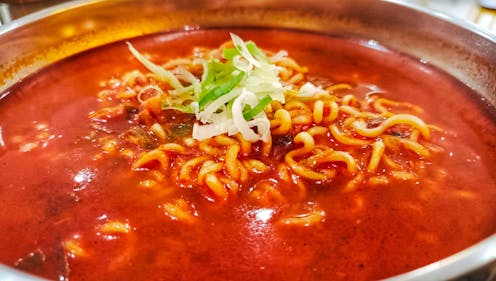Why doesn’t water help with spicy food? What about milk or beer?
- Written by Daniel Eldridge, Senior Lecturer in Chemistry, Swinburne University of Technology

Spicy foods taste spicy because they contain a family of compounds called capsaicinoids. Capsaicin is the major culprit. It’s found in chillies, jalapeños, cayenne pepper, and is even the active ingredient in pepper spray.
Capsaicin doesn’t actually physically heat up your mouth. The burning sensation comes from receptors in the mouth reacting to capsaicin and sending a signal to the brain that something is very hot.
That’s why the “hot” chilli sensation feels so real – we even respond by sweating. To alleviate the heat, you need to remove the capsaicin from your mouth.
So why doesn’t drinking water help make that spicy feeling go away? And what would work better instead?
Water-loving and water-hating molecules
To help us choose what might wash the capsaicin away most effectively, it’s helpful to know that capsaicin is a hydrophobic molecule. That means it hates being in contact with water and will not easily mix with it.
Look what happens when you try to mix hydrophobic sand with water.
On the other hand, hydrophilic molecules love water and are very happy to mix with it.
You’ve likely seen this before. You can easily dissolve hydrophilic sugar in water, but it’s hard to wash away hydrophobic oils from your pan using tap water alone.
If you try to wash hydrophobic capsaicin away with water, it won’t be very effective, because hydrophilic and hydrophobic substances don’t mix.
Going for iced water will be even less effective, as hydrophobic capsaicin is even less soluble in water at lower temperatures. You may get a temporary sense of relief while the cold liquid is in your mouth, but as soon as you swallow it, you’ll be back where you started.
Instead, a good choice would be to consume something that is also hydrophobic. This is because of an old-but-true adage in chemistry that “like dissolves like”.
The idea is that generally, hydrophobic substances will not dissolve in something hydrophilic – like water – but will dissolve in something that is also hydrophobic, as this video shows:
My mouth is on fire. What should I drink instead of water?
A swig of oil would likely be effective, but is perhaps not so palatable.
Milk makes for an ideal choice for two reasons.
The first is that milk contains hydrophobic fats, which the capsaicin will more easily dissolve in, allowing it to be washed away.
The second is that dairy products contain a protein called casein. Casein is an emulsifier, a substance that helps oils and water mix, as in this video:
Casein plays a large role in keeping the fat mixed throughout your glass of milk, and it also has a strong affinity for capsaicin. It will readily wrap up and encapsulate capsaicin molecules and assist in carrying them away from the receptor. This relieves the burning sensation.
OK but I hate drinking milk. What else can I try?
What about raita? This dish, commonly served with Indian curries, is made primarily from yoghurt. So aside from being its own culinary experience, raita is rich in fats, and therefore contains plenty of hydrophobic material. It also contains casein, which will again help lock up and remove the capsaicin.
Ice cream would also work, as it contains both casein and large amounts of hydrophobic substances.
Some studies have also shown that consuming drinks with large amounts of sugar can relieve spiciness.
What about reaching for that ice cold beer?
This is commonly suggested as a suitable approach to stop the burning. At first glance, this may seem a good idea because capsaicin is highly soluble in alcohol.
However, most beers only contain between 4–6% alcohol. The bulk of the liquid in beer is water, which is hydrophilic and cannot wash away capsaicin. The small amount of alcohol in your beer would make it slightly more effective, but not to any great degree.
Your curry and beer may taste great together, but that’s likely the only benefit.
In truth, an alcoholic beverage is not going to help much unless you go for something with a much, much higher alcohol content, which comes with its own problems.
Authors: Daniel Eldridge, Senior Lecturer in Chemistry, Swinburne University of Technology
Read more https://theconversation.com/why-doesnt-water-help-with-spicy-food-what-about-milk-or-beer-226624





